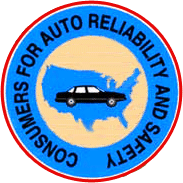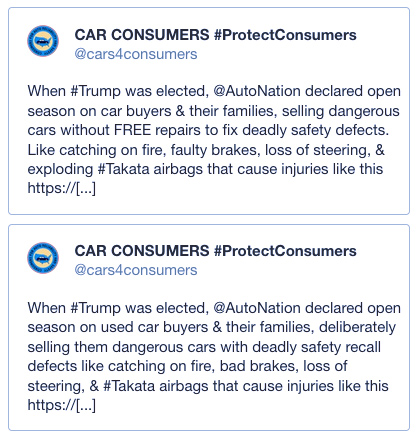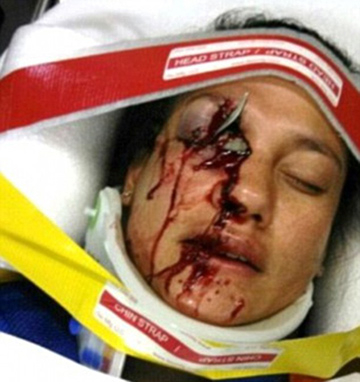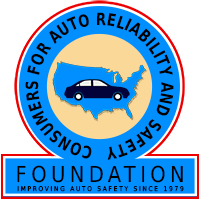United States House of Representatives
Committee on the Judiciary Subcommittee
on Commercial and Administrative Law
Honorable Linda Sanchez, Chairperson
March 6, 2008
Testimony
Presented by
Rosemary Shahan
President, Consumers for Auto Reliability and Safety
In Support of Passage of
H.R. 5312
The Automobile Arbitration Fairness Act
Consumers for Auto Reliability and Safety
1303 J Street, Suite 270
Sacramento, CA 95814
530-759-9440
Chairwoman Sanchez and Members of the Committee:
Thank you for the opportunity to testify today in support of HR 5312, the Automobile Arbitration Fairness Act of 2008. This desperately needed legislation will improve protections for consumers and also benefit honest businesses by freeing car buyers from being compelled to surrender their constitutional rights as a condition of purchasing or leasing a motor vehicle. We applaud your leadership in authoring this important consumer protection measure and also greatly appreciate the co-sponsorship of Members of this Subcommittee.
H.R. 5312 will allow consumers and auto dealers to resolve disputes through arbitration, if they choose, after a dispute has arisen. Thus, it will make participation in arbitration more informed and voluntary. H.R. 5312 will ensure that a consumer’s rights are protected against a fraudulent auto dealer who seeks to use a binding mandatory arbitration clause buried in a purchase contract to take advantage of that individual. The bill will also give auto consumers the same right to be free from binding mandatory arbitration agreements that auto dealers currently enjoy.
Background about Consumers for Auto Reliability and Safety
First, a disclaimer. Unlike others who may testify, I am not an attorney. I am a former college English teacher who had a horrendous car problem at a car dealership in Lemon Grove, California, while my family was stationed on active duty with the United States Navy in San Diego, in 1979. That experience led me to initiate California’s auto lemon law for car buyers, authored by Assemblywoman Sally Tanner, which became the model for similar laws in all 50 states.
Our organization, Consumers for Auto Reliability and Safety (CARS), is a national, award-winning non-profit auto safety and consumer advocacy organization based in Sacramento. CARS is dedicated to preventing motor vehicle-related fatalities, injuries, and economic losses. CARS has a long history of pro-consumer advocacy that has led to the enactment of numerous state laws and national regulations to improve vehicle safety, make our roads and highways safer, and make the automotive marketplace fairer, including several landmark measures signed into law by Governors from both major parties.
In the aftermath of Hurricanes Katrina, Wilma, and Rita, I was invited by the Senate Committee on Commerce, Science and Transportation Subcommittee on Consumer Affairs, Product Safety, and Insurance, Chaired by former U.S. Senator George Allen, to testify regarding flood and salvage vehicle frauds, which cost American car buyers billions each year and threaten the public health and safety.
In 2004 and 2005, CARS led efforts to make California’s Car Buyers Bill of Rights as strong as possible for consumers. That legislation (AB 68, Montañez), which reflects a compromise struck among key legislators, the Governor, and auto dealers, was spurred by a stronger ballot initiative proposed by CARS that polled at over 80% support statewide. AB 68 passed with overwhelming bi-partisan support and was signed into law by Governor Schwarzenegger in 2005. It took effect on July 1, 2006. While the law is seriously flawed, its enactment is evidence of widespread support for reforming auto sales in the nation’s largest automotive marketplace.
The most recent legislation CARS sponsored in California, SB 234, authored by Senator Ellen Corbett, passed unanimously and was signed into law by Governor Schwarzenegger. That new law extends protections under California’s auto lemon law to active duty members of our nation’s armed forces, regardless where they purchase or register their vehicles. 1
Pre-dispute mandatory binding arbitration deprives consumers of access to justice
Since 1979, I have listened to complaints from consumers around the nation who were harmed due to illegal practices perpetrated by auto dealers. The victims run the gamut. Most are fairly sophisticated and savvy consumers who succeeded in navigating other complex financial transactions, but were no match for unscrupulous auto dealers. Others are struggling students who just bought their first cars. Some of the students had to drop out of school because their vehicles kept breaking down, despite ads promising they were in “mint condition.” Others are active duty members of our Armed Forces and their families, who are often targeted by unscrupulous auto dealerships. 2
For decades, I have been able to offer consumers hope they could recover from their losses and be made whole, if they simply persisted in pursuing their rights. But over the past several years, that has changed. The laws are still on the books, but millions of consumers are enduring injustices without any meaningful recourse, due to the imposition of pre-dispute binding mandatory arbitration.
Pre-dispute binding arbitration is inherently unfair
As Members of Congress argued in favor of granting auto dealers access to courts for resolving disputes with auto manufacturers:
-
The contracts are take-it-or-leave it, boiler-plate contracts of adhesion.
There is no real opportunity to negotiate.
-
The parties to the contracts are on an unequal footing.
-
Arbitrators are inherently biased in favor of repeat customers, who can track their decisions and have the advantage of knowing which arbitrators have ruled in their favor in the past.
-
Arbitrators are not required to apply the law or adhere to judicial precedents.
-
Even if the arbitrators totally disregard the law, there is little or no review, and rarely any check on their power. There is seldom even any record that would be subject to review.
-
Discovery is either non-existent or very limited. Without discovery, consumers are severely disadvantaged. This enables crooked dealers to conceal material facts from their victims and from the arbitrators.
-
Arbitrations occur in a vacuum. They almost always operate in secret. If a dealer has engaged in widespread violations of the law, it may never come to the attention of law enforcement agencies or policymakers, who might otherwise act to protect the public.
HR 5312 will provide consumers with the same protections already enjoyed by auto dealers
The same arguments that were made by auto dealers and Congress in favor of preserving the rights of auto dealers apply equally to consumers, if not more.
As Senator Hatch stated when he introduced S. 1140, “The Motor Vehicle Franchise Contract Arbitration Fairness Act of 2001,” the new law was needed to protect auto dealers from having mandatory arbitration clauses imposed upon them by auto manufacturers, due to their “unequal bargaining power.” 3
As Senator Grassley, speaking in support of S. 1140, stated:
“While arbitration serves an important function as an efficient alternative to court, some trade-offs must be considered by both parties, such as limited judicial review and less formal procedures regarding discovery and rules of evidence. When mandatory binding arbitration is forced upon a party, for example when it is placed in a boiler-plate agreement, it deprives the weaker party the opportunity to elect another forum. As a proponent of arbitration I believe it is critical to ensure that the selection of arbitration is voluntary and fair…Unequal bargaining power exists in contracts between automobile and truck dealers and their manufacturers. The manufacturer drafts the contract and presents it to dealers with no opportunity to negotiate…The purpose of arbitration is to reduce costly, time-consuming litigation, not to force a party to an adhesion contract to waive access to judicial or administrative forums for the pursuit of rights under State law.”4
Senator Grassley also stated that:
“This legislation will go a long way toward ensuring that parties will not be forced into binding arbitration and thereby lose important statutory rights. I am confident that given its many advantages arbitration will often be elected. But it is essential for public policy reasons and basic fairness that both parties to this type of contract have the freedom to make their own decisions based on the circumstances of the case.” 5
While S. 1140 did not pass, auto dealers were given an exemption from the FAA, in order to preserve their rights, via passage of H.R. 2215 in 2002. That act, now codified at 15 U.S.C. section 1226, prohibits auto manufacturers from including any type of pre-dispute arbitration clause in franchise contracts with auto dealers. Specifically, it provides that arbitration may be used to settle a controversy arising out of a motor vehicle franchise contract only if both parties consent, in writing, and only after the dispute arises.
Unequal bargaining power exists between consumers and dealers
Clearly, consumers are in an even less equal bargaining position vis-à-vis auto dealers than are dealers, vis-à-vis auto manufacturers. It is now the norm for franchised auto dealers and the largest auto dealership chains to use pre-printed contracts that include mandatory pre-dispute binding arbitration. Lenders have informed auto dealers that they will not accept retail installment contracts for auto loans unless the dealers include binding mandatory arbitration clauses in the contracts.
Consumers are inherently in an unequal bargaining position, where they have little choice but to enter into a contract that deprives them of their rights, in order to obtain transportation. This is particularly true if they cannot afford to pay cash and must be approved for a loan, since lenders now refuse to accept contracts without binding mandatory arbitration clauses.
Thanks to franchise laws in all 50 states that grant auto dealers a special monopoly, consumers who wish to purchase a new vehicle are virtually captive to franchised auto dealers to make their purchase. They have no choice. They have to buy the car from a franchised auto dealer, or go abroad to buy direct from the factory.
Used car buyers have more choices, including purchasing from individuals and over the internet. In the past, consumers who chose to purchase vehicles from licensed dealers had a reasonable expectation that if there was a major problem, they would be protected by various state and federal laws. Now, due to the imposition of arbitration in dealer contracts, consumers may actually get LESS protection than if they bought the car from an individual.
Not only are the stakes high for consumers in terms of sheer dollar amounts, but they are also high in terms of the potential impact on their entire future. Worst case scenario: if the vehicle has serious hidden, undisclosed defects, it can kill them and/or members of their family, as well as others who happen to share the roads. A bad car deal can also cost them their job, destroy their credit, and saddle them with added debt.
Among the factors that create the vast inequality in bargaining position:
-
Dealers and their attorneys prepare the contracts and present them to the consumer. They are contracts of adhesion, presented on a take-it-or-leave-it basis, and many of the terms are not negotiable.
-
The contracts are lengthy and complex. The language is highly legalistic. Even highly-educated consumers find the contracts to be intimidating and confusing. This is particularly true of lease transactions.
-
Consumers generally lack access to legal counsel specializing in auto sales transactions. Dealers typically have attorneys on retainer. They also belong to trade associations that employ full-time high-powered legal talent.
-
Consumers are led to believe that when they purchase or lease a vehicle from a licensed auto dealership they have a reasonable expectation that the business practices are legitimate. To some extent, their guard is down.
-
Most consumers purchase a vehicle only two or three times a decade. More consumers are keeping their vehicles longer, making the length of time between purchases longer. Dealers typically buy and sell vehicles on a daily basis. They are pros.
-
When the product is a used car, auto dealers have superior knowledge of the history and condition of the product. For example, they know whether they bought the car at a deep discount from a “salvage” auction, where frame damage and other faults are openly announced.
-
For most car buyers, purchasing a vehicle is unlike any other transaction they have ever experienced. School curriculums typically do not prepare students for the high-stakes negotiations. Other purchasing experiences do not prepare car buyers for the unique challenges of buying a car.
-
Sales and finance and insurance (F & I) personnel receive intensive training in how to maximize profits for the dealership. They typically receive bonuses and perks based on their performance, so have strong incentives to get the most out of each transaction. Some F & I managers are paid $300,000 or more per year, mostly in bonuses, based on how much they extract from each customer.
-
Auto sales scams have gone high-tech. The practices are increasingly sophisticated, and are challenging for even high-tech crime specialists to identify.
-
Typically, pre-dispute binding arbitration contracts allow dealers to select the forum and decide on the terms. This loads the dice in favor of defendants, who are in a superior position to select forums that will rule in their favor.
-
Some arbitration forums allow arbitrators to charge high fees, such as $500 to $1,000 per hour, plus administrative charges. The vast majority of consumers, who have to stretch their budgets to purchase a vehicle, are in no position to shell out another $20,000 or more to obtain a biased decision.
-
Some arbitration forums allow arbitrators to inflate their charges by requiring briefings and hearings for even minor disputes between counsel. In court, minor disputes are discouraged by code, which requires or allows judges to award sanctions.
Overview: scope and types of auto sales scams; private enforcement is essential
Last year, American car buyers purchased 57,500,000 vehicles. Of those, 16,100,000 were new and 41,400,000 were used. 6 For most consumers, a motor vehicle is the second-largest purchase they make, second only to a home. The average price of a new vehicle is now estimated to be over $27,800, and used cars average about $13,900. 7
Given the immense size of the automotive marketplace, and the vast sums involved, private enforcement of federal and state consumer protection laws is essential to deter massive fraud. No federal, state, or county agency has the staff or resources necessary to police the tens of millions of transactions that occur each year. Typically, law enforcement agencies act only when there is a pattern and practice of rampant lawbreaking that comes to their attention. Especially in the aftermath of 9/11, state motor vehicle departments, which license auto dealers, have other priorities. To a great extent, consumers are on their own.
Making matters worse, the most-prevalent auto sales-related crimes are increasingly sophisticated, involve high-tech prowess, and often cross state lines. Prosecuting those crimes has become increasingly challenging and costly for public law enforcement agencies at a time when they are strapped for resources.
Here in California, passage of Proposition 64, backed largely by auto dealers, eliminated the ability of non-profit organizations to represent the public interest in curbing widespread violations of state laws, creating a huge enforcement vacuum. Then Governor Schwarzenegger vetoed SB 1489 (authored by Senator Ducheny), which would have allowed the Attorney General to continue to be able to recoup the costs incurred in litigating against corrupt corporations with enormous resources, on behalf of the citizens of California, when the Attorney General prevails. That has inevitably lessened the ability of our state’s top cop to address all but the most pressing cases.
Counties are also reeling from the downturn in the economy, and District Attorneys generally tend to emphasize violent crimes over property crimes.
At the same time, the public interest in curbing auto sales frauds has never been clearer or stronger. According to the U. S. Department of Justice, auto-related frauds rank among the nation’s top property crimes. To give some sense of the scope of just part of the auto sales problem: According to a report commissioned by the U.S. DOJ, completion of a national database system to help curb illicit activity involving stolen and damaged autos would save the American public between $4 billion and $11.3 billion per year. 8
According to the National Highway Traffic Safety Administration, odometer fraud costs consumers over $1 billion a year, based solely on the difference between the price car buyers pay and the actual value of the vehicles with rolled-back odometers. The agency has also found that the incidence of odometer fraud is escalating.
Frauds involving the illegal sales of damaged autos cost American consumers billions of dollars each year. According to Experian Automotive, approximately 7 million vehicles that were deemed to be a total loss because they sustained severe damage in wrecks or floods are now re-registered and being driven our roads. 9 Many millions more have sustained major damage, but were not totaled. Dealers themselves acknowledge that auto salvage frauds, including “title washing” across state lines, is a serious problem that needs to be addressed.
In California alone, more than 1,690,000 vehicles currently registered for use on our roads have had their titles branded as “salvage,” indicating they were so severely damaged it would not pay to fix them properly. 10
Damaged auto frauds also pose a serious threat to the public health and safety. For example, shady rebuilders often fail to replace deployed air bags, which can be expensive. Instead, they stuff the compartments where the air bags belong with shop rags, paper, or whatever else is handy. In some cases, consumers are killed or suffer debilitating injuries when they are sold rolling wrecks that are structurally unsound. Some vehicles, known as “chop jobs,” are literally halves of two different cars, welded together. On impact, they split apart, spilling their hapless occupants onto the highway.
Auto “lemon laundering” of seriously defective lemon vehicles, previously repurchased by the manufacturers due to incurable defects, then resold to unsuspecting used car buyers, costs consumers at least another $1 billion per year. It also exposes car buyers and their families to life-threatening safety defects including faulty brakes and steering, electrical fires, engines that intermittently stall in traffic without warning, wheels that fall off, and other hazards.
Other common scams perpetrated by auto dealers that cost American consumers billions more:
-
Charging excessive hidden dealer “markups” (“markups” are kickbacks dealers receive from lenders in return for raising the interest on auto loans, above the rate the consumer qualifies for, based on their credit history)
-
Falsifying signed credit applications to exaggerate income
-
Engaging in “yo-yo” financing to gouge purchasers (misleading or intimidating consumers into accepting worse terms, after the consumer has taken possession of their new purchase)
-
Engaging in loan packing of unwanted items (adding high-profit extras while misrepresenting their cost to the buyer, in a sophisticated shell game)
-
Forging documents
-
Selling used cars or “demonstrators” as new cars
-
Concealing prior status as a daily rental, police vehicle, or taxicab
-
Taking vehicles in trade and failing to pay off the liens, as promised
-
Failing to disclose “negative equity” from prior transactions that is rolled over into new loans
-
Engaging in high-pressure sales tactics, such as refusing to return keys for buyers’ vehicles after they are test-driven, until they purchase another vehicle
-
Altering VIN numbers to disguise vehicle histories
-
Altering vehicle history reports to conceal prior damage and odometer rollbacks
-
Selling stolen vehicles
From a macro-economic perspective, auto sales and lending practices are shrinking the market for homes and other products by soaking up a disproportionate share of consumers’ take-home pay. Except for unjustifiably inflated auto loans, millions more consumers would qualify to purchase a home.
Auto loans are increasingly disproportionate to the value of the vehicles. This is particularly likely to occur when the true value is concealed from the buyer. 11 In order to make the artificially inflated monthly payments affordable, auto loans are getting longer. The median auto loan is now over 60 months, with increasing numbers stretching into 7 or 8 years. As a consequence, consumers trade in their cars long before the loan is paid off. Between roughly 30% to 40% of car buyers are now “upside down” – burdened with “negative equity” -- when they purchase their next vehicle. That debt is then rolled over into the next transaction. Car buyers are sinking deeper into debt for a product that depreciates the moment they drive it off the lot.
All 50 states have tried to protect car buyers from these scams, but the illegal activity can still flourish and individuals are severely harmed when consumers are denied their rights due to the imposition of pre-dispute binding arbitration agreements.
The good news is that by adopting H.R. 5312, and empowering individual consumers to obtain relief and deter auto scams, Congress can make a major, tangible improvement in the lives of tens of millions of Americans and their families.
States rely on Congress to address arbitration abuses
Speaking in support of passage of S. 1140, to improve access to the courts for auto dealers, Senator Grassley explained that:
“In 1925, when the [Federal Arbitration Act] FAA was enacted to make arbitration agreements enforceable in Federal courts, it did not expressly provide for preemption of State law. Nor is there any legislative history to indicate Congress intended to occupy the entire field of arbitration. However, in 1984 the Supreme Court interpreted the FAA to preempt state law in Southland Corporation v. Keating. Thus, State laws that protect weaker parties from being forced to accept arbitration and to waive State rights, such as Iowa’s law prohibiting manufacturers from requiring dealers to submit to mandatory binding arbitration, are preempted by the FAA.” 12
Because the FAA has been interpreted to preempt state law, states are hamstrung in their ability to protect their citizens from the pitfalls of arbitration.
In 2004, California legislators considered AB 2656, The Car Buyer’s Legal Equality Act of 2004, authored by former Assemblymember Hannah-Beth Jackson. It would have ensured that consumers who enter into agreements with franchised auto dealers, to waive rights or procedures under state laws, do so voluntarily. It would also have deemed any agreement to waive rights under state law that was not knowing and voluntary to be unconscionable, against public policy, and unenforceable.
Opponents argued that AB 2656 was preempted by the FAA. While the author and proponents disagreed, it ultimately failed to pass. The defeat of AB 2656 makes it all the more important for Congress to assert its leadership on this issue. Taking at face value the opponents’ argument that states’ hands are tied, they themselves make the case that it is entirely up to Congress to act.
Enactment of HR 5312 will benefit consumers, honest business, and the nation
Passage of HR 5312 will go a long way toward curbing a whole host of shady practices that harm not only the individuals who purchase the vehicles; but also their families; their employers; honest auto dealers that are at a competitive disadvantage; other businesses that suffer collateral damage due to auto frauds, which drain dollars that could be spent on other legitimate products and services; and the entire nation.
Case study: Odometer fraud flourishes under mandatory arbitration clauses
Most people mistakenly believe that odometer fraud is a rare occurrence. However, in reality, odometer fraud is rampant. It is now one the leading property crimes in the nation. Unscrupulous auto dealers traffic in vehicles with rolled back odometers, either altering the odometers themselves or purchasing them from criminals who simply reprogram the odometers, a crime that is difficult to trace.
Consumers who purchase vehicles with altered odometers face severe losses. The difference in value between what they pay and the vehicle’s true worth is usually thousands of dollars. In addition, they face unanticipated expenses which can mount up and add thousands of extra charges, such as engine and/or transmission replacements. They may also experience safety issues when brakes and other safety-related parts fail sooner than expected. To make matters worse, any warranty or service contract they purchase may be void, due to the altered odometer. This is a triple whammy for victims of odometer fraud.
The Federal odometer law, 49 U.S.C. Chapter 327 (Public Law 103-272), prohibits the disconnection, resetting, or alteration of a motor vehicle's odometer with intent to change the number of miles indicated thereon. But having a law on the books and having it actually enforced are two different things.
According to the National Highway Traffic Safety Administration’s Office Of Odometer Fraud Investigation, “Odometer tampering continues to be a serious crime and consumer fraud issue. In 2002, NHTSA determined this crime allows more than 450,000 vehicles to be sold each year with false odometer readings, milking American car buyers out of more than $1 billion annually…The increased cost consumers pay to purchase passenger vehicles with odometer rollback of $1,056,000,000 per year makes odometer fraud one of the top crimes against property in the United States” 13
The agency currently estimates that odometer fraud costs each victim approximately $4,000. That figure does not count the costs of unanticipated major repairs; job loss due to faulty vehicles that break down and become inoperable and/or unsafe to drive; or losses incurred when roll-back vehicles are traded in, the true mileage is discovered, and the buyer owes far more than the car is worth.
More recently, NHTSA found that the problem has become even worse. “From 2002 to 2005, we have seen a definite escalation of odometer fraud. New car prices, coupled with the increased demand for late-model, low-mileage used cars, has made odometer fraud more profitable than ever.”
On its website, NHTSA states that “Violations of any of the [Federal odometer law] may subject the violator to civil liability if it is determined that his/her actions were intended to defraud the purchaser. The law makes available to the buyer a remedy in the amount of $1,500 or treble damages, whichever is greater, together with attorney's fees. To obtain this remedy, Section 32710 of the law permits the buyer to bring a private civil action in State or Federal court. He may do this by contacting his own attorney or the State Attorney General. The Federal Government has the authority to bring actions for civil and criminal penalties; however, it cannot bring actions on behalf of consumers. We strongly recommend that you consult your own private attorney to determine your legal rights and remedies in this matter.”
NHTSA reports that is has a total of 5 criminal investigators and 4 support staff who handle odometer fraud cases for the entire nation. That translates into less than one NHTSA field investigator per 11.5 million vehicle sales, each year. While some states have officers who work with NHTSA on occasion to curb odometer fraud, usually on a part-time basis, they lack the resources to focus on any but the largest odometer fraud rings. NHTSA found that only 4 states have taken even the most basic steps to track odometer fraud and that fewer than 10 states routinely reported suspected odometer fraud to the federal authorities. 14
Given the sheer volume of transactions and the seriousness of the crime, Congress saw fit to provide for strong sanctions to encourage victims of odometer fraud to pursue their rights, to police the marketplace on behalf of the motoring public and to help foster confidence in car purchasing from licensed dealers. Accordingly, our nation depends almost entirely upon the civil justice system to curb this illegal practice, which is a particularly pernicious form of theft. However, due to the imposition of binding mandatory arbitration, odometer fraud can easily flourish, leaving hapless victims with little or no recourse.
All an unscrupulous dealer needs to do, in order to get away with the crime, is to insert an arbitration clause in the contract. Suddenly, the consumer no longer has access to the remedies intended by Congress. Instead of being able to seek damages, including penalties and attorneys fees, victims may be eligible to receive only a refund. Their fate is in the hands of an inherently biased arbitrator who depends on the auto dealer for repeat business. The process is not open and the decision is only rarely subject to review. Thus, the deterrent effect of the Odometer Act is defeated by the arbitration clause.
Also, because of limited discovery, and the secrecy inherent in arbitration, someone who is a victim of odometer fraud may never find out they are one of 100 who were similarly cheated. This means that even if individual consumers prevail in arbitration, dealers who deliberately engage in a pattern and practice of committing odometer fraud may never be brought to justice for their crimes, even if they are serial fraudsters.
In addition, the secrecy inherent in the arbitration means that ultimately the free market cannot work to reward legitimate businesses and give them a competitive advantage. Instead, it allows crooked enterprises to flourish, shielded from public scrutiny, giving them an unfair competitive advantage.
New and growing problem: dealers going out of business, fail to pay off liens
As the auto market softens and auto manufacturers consolidate dealerships, more auto dealers are going out of business, leaving their customers holding the bag. One of the worst scams: increasing numbers of dealers are taking consumers’ vehicles in trade, with a promise they will pay off the liens. Then they fail to follow through on that obligation. This has reached epidemic proportions, and involves some long-established franchised auto dealerships. Consumers have been saddled with millions of dollars in unpaid liens and other losses, forcing some consumers into bankruptcy.
In response, California enacted SB 729, authored by Senator Alex Padilla, to establish a restitution fund to provide relief to victims of auto dealers who go out of business. The new law will assess a fee that is paid by each dealer, based on the number of vehicles sold, to provide assets for the restitution fund. 15 However, the California fund is unique and other states have failed to act.
Conclusion
We strongly urge adoption of H.R. 5312. This measure is urgently needed to allow car buyers to enforce important rights under existing federal and state laws. Passage of H.R. 5312 will achieve important public policy goals, help protect the public from some of the worst property crimes, increase healthy competition, and improve auto safety.
Thank you again for the opportunity to testify in support of this important consumer protection measure.
1 See report posted on CARS’ website, at: http://www.carconsumers.com/SB234_LL.html
2. According to the Armed Forces themselves, auto-related frauds are a serious problem that adversely impacts morale, readiness, and the ability of our troops to accomplish their mission. More details, including links to news reports, are posted at: http://www.carconsumers.com/military_ripoffs.html.
3. Statements on Introduced Bills and Joint Resolutions, United States Senate, June 29, 2001. Statement by Senator Hatch of Utah.
4. Statements on Introduced Bills and Joint Resolutions, United States Senate, June 29, 2001. Statement by Senator Grassley of Iowa.
5. Statements on Introduced Bills and Joint Resolutions, United States Senate, June 29, 2001. Statement by Senator Grassley of Iowa.
6. “Keys to Buying a Used Car,” by Ken Bensinger, Los Angeles Times, March 2, 2008. The Los Angeles Times cites CNW Marketing Research Inc.as its source.
7. Edmunds.com. See website at: http://www.edmunds.com/advice/buying/articles/45310/article.html
8. “In 2001, at the request of the Department of Justice, the Logistics Management Institute (LMI) submitted a report to DOJ's National Institute of Justice, found that: "…NMVTIS-if it is fully implemented in all 50 states and the District of Columbia, and if it is 100 percent effective-can achieve benefits in the range of $4 billion to $11.3 billion annually."—US Department of Justice website, at: http://www.ojp.gov/BJA/grant/nmvtis.html The cost-benefit analysis is posted at: http://www.ojp.gov/BJA/pdf/LMI_NMVTIS.pdf
9. “Citing 15-Year Delay, Suit Seeks Action on Rebuilt Wrecks,” by Christopher Jensen, The New York Times, February 10, 2008. “Experian automotive, an Illinois company that sells information gathered from state motor vehicle departments, said its records showed that there were about seven million vehicles on the road that at one time were damaged so badly that the titles were marked as ‘junked, scrapped, unrebuildable, salvage, or rebuilt.’”
10. Source: California Department of Motor Vehicles. Based on number of vehicles with “salvage” titles as of July 1, 2007. Note: this figure is artificially low, as it fails to include vehicles that were never properly branded or have had their titles “washed,” a very common form of fraud.
11. Changes in federal bankruptcy law, backed by auto dealers and signed into law by President Bush, shifted substantial risk from lenders and dealers to consumers. Unlike before, when consumers were liable only for the fair market value of their vehicles, they are now being held liable for the entire amount of loans, even when the vehicle is worth far less than the amount they owe, due to undisclosed prior damage or odometer rollbacks.
12. Statements on Introduced Bills and Joint Resolutions, United States Senate, June 29, 2001. Statement by Senator Grassley of Iowa.
13. National Highway Traffic Safety Administration Report Number DOT HS 809 441, April, 2002.
14. National Highway Traffic Safety Administration Report Number DOT HS 809 441, “Preliminary Report: The Incidence Rate of Odometer Fraud,” April, 2002. Note: these figures do not reflect other costs inflicted on victims of odometer fraud, including: costs of repairs, diminished value upon resale, lost work due to vehicle failures, and related costs. It also fails to include vehicles with altered odometers that did not appear in the Carfax database, which NHTSA acknowledges is far from complete.
15. For examples of losses inflicted on consumers by dealers that went out of business, see California Senate Judiciary Committee analysis for SB 729 (Padilla), at: http://info.sen.ca.gov/pub/07-08/bill/sen/sb_0701-0750/sb_729_cfa_20070425_141418_sen_comm.html







